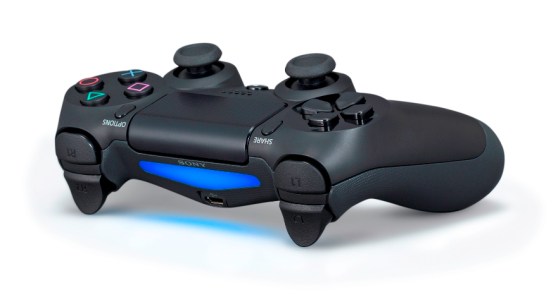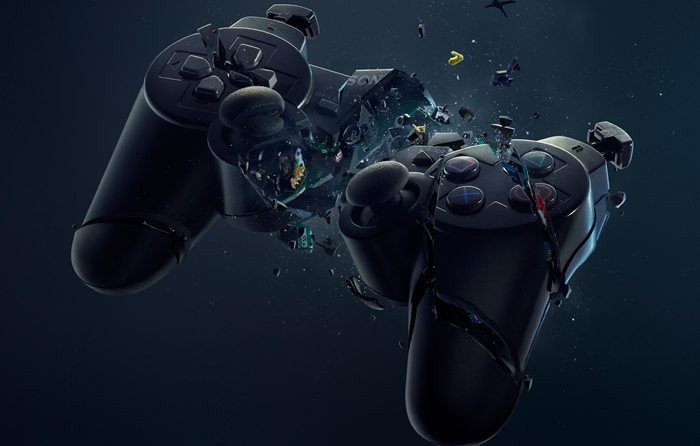This post has not been edited by the GamesBeat staff. Opinions by GamesBeat community writers do not necessarily reflect those of the staff.

Tonight’s announcement tarnishes the legacy of a once-great controller.
Sony trotted out the newest PlayStation system’s DualShock 4 like a trollop, festooned in new tech like cheap jewelry. All the confidence that it possessed on its first outing was gone — replaced by the grim desperation of a middle-aged woman in a college bar. Fresh cosmetic surgery scars hidden by pale makeup, hurriedly clinging to any able-bodied man who drunkenly pays attention. Lipstick stains and regret like cold rain. Decades of experience and potential legacy thrown away for a chance to go to a party she shouldn’t even want to attend. Time only makes fools of the foolish.
And if there was ever a time for game controllers to be foolish, this is it. Much has changed since the beginning of the last console cycle. Not just advancements in tech but a fundamental shift in the end user’s relationship with the video game. A relationship that has altered the game itself. New means of conveyance, control, and access have converged, destroying the conventions of the medium to such a degree that we don’t even have an agreed upon term for what, exactly, we’re doing when we save the earth from an alien invasion or hurl fat birds at overeducated pigs.
Sony calls their latest controller the DualShock 4, but it is most certainly not a DualShock. An entirely new controller from the company would have been a far more historic event than the iterative upgrade it delivered. The future crested the horizon last May when Watch Dogs debuted at the Electronic Entertainment Expo trade show, and dawn is slowly coming into focus. All eyes are forward, but this is also the last chance for a clear look back at the night.

Above: In my house, it would have been a Viking retirement.
Sixteen years ago, the analog stick confidentially kicked down the front door of the game industry. It represented everything new and innovative about video games and the physical manifestation of the move to 3D graphics. And while the Nintendo 64 controller was grinding itself to a pulp and permanently callusing the hands of an entire generation, the DualShock stepped forward to show the world all that could be right with controller design: Comfortable, functional, and capable of withstanding even the most passionate rage quits. It was the best of a new breed of controllers, and while its basic design began with Nintendo in 1983, Sony perfected it in 1997.
Fifteen years on and the DualShock has hardly changed. It’s been given home buttons, shiny lights, and six-axis. It has lost a cable and gained bluetooth. Its detractors in recent years have said it’s too small and that it lacks innovation. Many say it was bested by Microsoft’s Xbox 360 controller. But through every rebirth and barb, it has faithfully served a fan base so accustomed to it that they hardly notice they’re holding a controller anymore. To date, Sony will has given the world a game controller whose life span is only rivaled by that of the keyboard and mouse or the arcade stick.
Game companies can’t be blamed for trying to define the future in these confusing times. But motion control, touch screens, and accelerometers? These do not represent the next step for video games. Historically, they compare most favorably to the rise of the personal computer in the 1980’s. Those who could scarcely fathom a computer small enough to fit into their homes found themselves pointing and clicking and word-processing. They slowly warmed to the technology, and it soon became an indispensable part of day-to-day life.

Above: Last known photograph of Maude (right).
Their modern day proxy is every person who never picked up a game controller suddenly becoming an unabashed Wii Bowling or Angry Birds addict. Like the Macintoshes of old, smartphones and Wii remotes woo with dulcet tones — their converts unaware of what’s happened until it’s too late.
But the Macintosh didn’t come with Doom preinstalled. In spite of technology’s exponential growth, change only lives in the wind. The next few years will test the creativity of the game industry, and we will see a fallout of Virtual Boyan scale, but the DualShock name shouldn’t have been dragged into the maelström. Sony has risked the legacy of its historic contribution for a chance at one more party.
They should have let it put on a turtleneck and retire with dignity.
